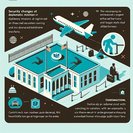
The thirtieth UN climate summit in Belém was supposed to gavell out at 6 p.m. on 21 November, but by midnight negotiators were still huddled over a draft that—controversially—deleted any mention of phasing out fossil fuels. Brazilian COP president André Corrêa do Lago pleaded for unity, yet the European Union flatly rejected the text, while Saudi Arabia led the opposition bloc. With no deal in sight, the summit spilled into an unscheduled ‘Day 12’.
The diplomatic impasse instantly became a mobility headache. Roughly 15,000 of the 48,000 accredited participants had tickets to leave Brazil between 22 and 23 November. Air-navigation authority CGNA issued an extraordinary NOTAM at 03:15 a.m. local time extending COP-specific slot-coordination and no-fly zones around Val-de-Cans Airport until 24 November. Airlines were asked to honour the original waiver that lets delegates change tickets without penalty; Gol and Latam loaded 18 relief flights to Brasília, São Paulo and Miami, while TAP added 460 seats to Lisbon over the weekend.
Brazil’s Immigration Department quietly updated its COP30 e-Visa FAQ, clarifying that the free electronic visa remains valid through 31 December even if the holder’s accreditation letter lists a 10-21 November date range. Border agents received a field bulletin instructing them to admit late-departing participants provided they carry a UNFCCC badge or letter of extension. Hotels, meanwhile, face capacity strain: the Belém hoteliers’ association said occupancy is 104 per cent after factoring in river-boat berths and pop-up hostels; nightly rates have jumped 37 per cent since Thursday.
![COP30 Talks Run Overtime, Forcing Delegates to Extend Stays and Brazil to Keep Travel Measures in Place]()
For corporate mobility managers the overrun means re-booking flights during Brazil’s busy pre-holiday period, when seat load factors already average 92 per cent. Travel-risk firms recommend locking in outbound inventory within 24 hours and factoring in additional time at security perimeters, which now operate 24/7 instead of the planned 18-hour cycle. Ground-handlers report that VIP car permits issued for 10-21 November will continue to be honoured, but vehicles must pass renewed inspection for explosives.
The summit’s extension also delays the dismantling of temporary e-gates and extra immigration booths installed at Belém airport. Federal Police say the hardware will stay active at least until 27 November, giving Brazil a live pilot of ‘surge-capacity’ border technology that could be redeployed for the G20 leaders’ meeting in Rio next year. Experts predict the experience will accelerate Brazil’s planned roll-out of ABC (Automated Border-Control) gates to eight additional airports in 2026.
Should talks drag on further, Brazil may consider issuing a blanket 10-day grace period identical to that used during the Rio 2016 Olympics—an option the Ministry of Justice is already drafting. Either way, the COP30 deadlock is no longer just a climate story; it has morphed into a real-time stress test of Brazil’s visa, airport and accommodation systems.
The diplomatic impasse instantly became a mobility headache. Roughly 15,000 of the 48,000 accredited participants had tickets to leave Brazil between 22 and 23 November. Air-navigation authority CGNA issued an extraordinary NOTAM at 03:15 a.m. local time extending COP-specific slot-coordination and no-fly zones around Val-de-Cans Airport until 24 November. Airlines were asked to honour the original waiver that lets delegates change tickets without penalty; Gol and Latam loaded 18 relief flights to Brasília, São Paulo and Miami, while TAP added 460 seats to Lisbon over the weekend.
Brazil’s Immigration Department quietly updated its COP30 e-Visa FAQ, clarifying that the free electronic visa remains valid through 31 December even if the holder’s accreditation letter lists a 10-21 November date range. Border agents received a field bulletin instructing them to admit late-departing participants provided they carry a UNFCCC badge or letter of extension. Hotels, meanwhile, face capacity strain: the Belém hoteliers’ association said occupancy is 104 per cent after factoring in river-boat berths and pop-up hostels; nightly rates have jumped 37 per cent since Thursday.

For corporate mobility managers the overrun means re-booking flights during Brazil’s busy pre-holiday period, when seat load factors already average 92 per cent. Travel-risk firms recommend locking in outbound inventory within 24 hours and factoring in additional time at security perimeters, which now operate 24/7 instead of the planned 18-hour cycle. Ground-handlers report that VIP car permits issued for 10-21 November will continue to be honoured, but vehicles must pass renewed inspection for explosives.
The summit’s extension also delays the dismantling of temporary e-gates and extra immigration booths installed at Belém airport. Federal Police say the hardware will stay active at least until 27 November, giving Brazil a live pilot of ‘surge-capacity’ border technology that could be redeployed for the G20 leaders’ meeting in Rio next year. Experts predict the experience will accelerate Brazil’s planned roll-out of ABC (Automated Border-Control) gates to eight additional airports in 2026.
Should talks drag on further, Brazil may consider issuing a blanket 10-day grace period identical to that used during the Rio 2016 Olympics—an option the Ministry of Justice is already drafting. Either way, the COP30 deadlock is no longer just a climate story; it has morphed into a real-time stress test of Brazil’s visa, airport and accommodation systems.








